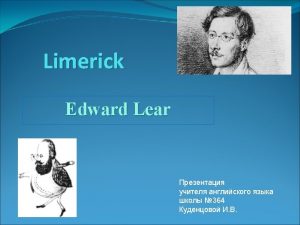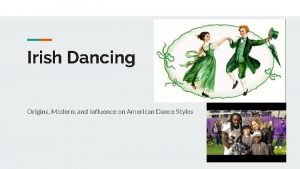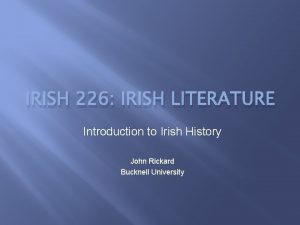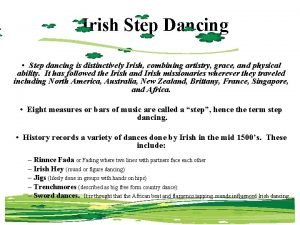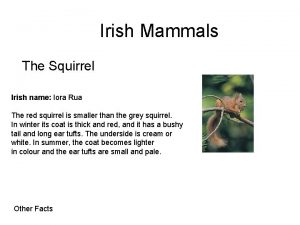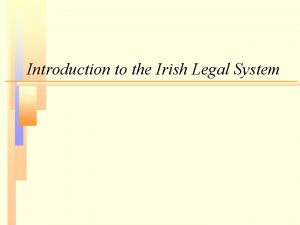The History Limerick is a form of Irish



























- Slides: 27


The History Limerick is a form of Irish poetry. Limericks Limerick College of Business Studies were short and easy to compose. They were often read in English pubs by sailors and beggars. They tell about different funny things that happened with strange people. It is a type of humorous poems. It is always short, often nonsensical and funny. The word comes from the Irish town of Limerick, a sea port. Limerick is the third largest city in Ireland. Limericks were used as poems for children. The first limericks for children were written by Edward Lear in 1846 in “A book of Nonsense”. He never used the word "limerick"; in the 1872 in his book, he called his poems "nonsense rhymes", or "nonsense pictures and rhymes" as the illustrations were very nice and very important. Lear wrote 212 limericks. Nonsense - ерунда, чепуха


Эдвард Лир Edward Lear was born on the 12 th of May 1812 in Highgate, a suburb of London. He was an artist, illustrator and writer. He was the 20 th child of his parents. His father had gone bankrupt and the family had to live in poverty. At the age of fifteen, he and his eldest sister Ann left the family home and set up house together. He started work as a serious illustrator and his first publication was at the age of 19. His paintings were very good and Edward Lear gave drawing lessons even to Queen Victoria. He had a good sense of humour. In 1846 he published “A Book of Nonsense”, a volume of limericks which make this form of poems popular. He was never married. Because of bad health he couldn’t live in wet climate, and Lear left England. From the age of nineteen he travelled round the world and visited more than twenty countries. Lear did not stay anywhere longer, than for a year. He lived and travelled alone. The only close friend, who lived near Lear for ten years, was his cat Foss. He died in San Remo at the age of seventy six in 1888.


What is Limerick? LIMERICKS Limericks a re humorou s short poem five lines, th s with ree long an d two short o The first, se nes. cond, and f i f t h lines rhym (forming a triplet), and e h a ve the same num¬ber of syllables; T h e third and f lines rhyme ourth (forming a c o uplet), and the same nu have mber of syl l a b les. Limeric often begin with the w ks o r d s: The re once was. . . or There was a. . .

A limerick is a silly poem with five lines. Lines 1, 2, and 5 of Limericks have seven to ten syllables and rhyme with one another. Lines 3 and 4 of Limericks have five to seven syllables and also rhyme with each other. It rhymes - a-a-b-b-a. Limericks often start with the line "There once was a. . . " or "There was a. . . " There was a Young Lady of Niger, Who smiled as she rode on a tiger; They returned from the ride With the Lady inside, And the smile on the face of the tiger. Одна хохотушка-девица Любила кататься на львице. Признаться вам честно – Девица исчезла, Зато улыбается львица.





Limericks by Edward Lear from A Book of Nonsense Limerick There was an Old Man with a nose, Who said, 'If you choose to suppose, That my nose is too long, You are certainly wrong!' That remarkable Man with a nose. Limerick There was an Old Man with a beard, Who said, 'It is just as I feared! Two Owls and a Hen, Four Larks and a Wren, Have all built their nests in my beard!' Жил на свете старик в бороде. Говорил он: «Я знал, быть беде. Две совы, три чижа И четыре стрижа Свили гнезда в моей бороде» . перевод: Б. Архипцева Длинноносый старик из Литвы Говорил: «Если скажете вы, Что мой нос длинноват, В чем же я виноват – Ведь не я так считаю, а вы!» перевод: М. Фрейдкина




How many lines has limerick got? What words does it usually begin with? What lines have rhyme? What does the first line tell us?







There was an Old Man of Baimak, Who ate nothing except bishbarmak. As his belly grew big He resembled a pig That gluttonous Old Man of Baimak. There was an Old Lady whose sack Was always filled up with chak-chak. When they said, “Give me one” She exclaimed, “You’ll got none!” That admirer of tasty chak-chak. There was a Young Man of Madras, Who was dreaming of tasting toukmas, When they offered him noodles, He cried “You are doodles !” That umbrageous Young Man of Madras.

Задание 4: choose the correct letter a, b or c. 1. а) Edward Lear b) King Edward c) Edward Hicks - made famous the limerick. 2. The word “limerick” came from: a) Scotland b) Ireland c) England 3. Collections of limericks began to appear in about: a) 1820 b) 1830 c) 1920 4. Edward Lear was born in 1812 in: a) London b) Glasgow c) Liverpool 5. He was the: a) eldest b) youngest c) smallest in the family of 21 children. 6. Lear was good at painting: a) birds b) children c) birds and animals 7. He entertained the children with: a) funny songs b)humorous stories c) comic drawings and limericks 8. He wrote: a) 4 books b) 3 books c) 1 book 9. Lear died in San-Remo, Italy in: a) 1888 b) 1889 с) 1880


There was a Young Lady of Russia, Who screamed so that no one could hush her; Her screams were extreme, No one heard such a scream, As was screamed by that lady of Russia. There was an Old Person of Gretna, Who rushed down the crater of Etna; When they said, «Is it hot? » He replied, «No, it's not!» That mendacious Old Person of Gretna. There was an old person of Fife, Who was greatly disgusted with life, They sang him a ballad, And fed him a salad Which cured that old person of Fife. There was an Old Man, who when little, Fell casually into a cettle; But growing too stout, He could never get out, So he passed all his life in the kettle. Жил мальчик из города Майена, Свалившийся в чайник нечаянно. Он сидел там, сидел И совсем поседел, Этот бывший мальчишка из Майена. Жил-был старичок у причала, Которого жизнь удручала. Ему дали салату И сыграли сонату, И немного ему полегчало. Некий старец из города Гретны Обнаружился в кратере Этны. «Там не жарко, скажи? » Старец, живший по лжи, «Да ничуть!» - отвечает из Этны. Вот вам некая Мисс из России. Визг ее был ужасен по силе И разил, как кинжал. Так никто не визжал, Как визжала та Мисс из России.

Список использованных ресурсов: o «Стихи матушки Гусыни» , Сборник, М. : Радуга, 1988 г. - 684 с. o «Ми вверх тормашками» (английский юмор в стихах), Изд-во » Прогресс» , 1978 г. Редактор Т. Н. Шишкина. ohttp: //images. yandex. ru/yandsearch? p=1&text=%D 0%9 B%D 0%B 8%D 1% 80%20%D 0%AD%D 0%B 4%D 0%B 2%D 0%B 0%D 1%80%D 0%B 4 ohttp: //ru. wikipedia. org/wiki/Лир, _Эдвард ohttp: //lir. ramot. ru/limeriki/lim 1. htm ohttp: //www. vilavi. ru/det/041008. shtml ohttp: //www. people. su/65755 ohttp: //ru. encydia. com/en/Эдвард_Лир ohttp: //dic. academic. ru/book. nsf/4764094/Жил+один+старичок. . .
 Limerick examples
Limerick examples Origin of riverdance
Origin of riverdance Limerick poem origin
Limerick poem origin Rhyme of goal
Rhyme of goal Present continuous affirmative sentences
Present continuous affirmative sentences Hát kết hợp bộ gõ cơ thể
Hát kết hợp bộ gõ cơ thể Ng-html
Ng-html Bổ thể
Bổ thể Tỉ lệ cơ thể trẻ em
Tỉ lệ cơ thể trẻ em Gấu đi như thế nào
Gấu đi như thế nào Chụp tư thế worms-breton
Chụp tư thế worms-breton Chúa sống lại
Chúa sống lại Các môn thể thao bắt đầu bằng tiếng đua
Các môn thể thao bắt đầu bằng tiếng đua Thế nào là hệ số cao nhất
Thế nào là hệ số cao nhất Các châu lục và đại dương trên thế giới
Các châu lục và đại dương trên thế giới Công thức tính độ biến thiên đông lượng
Công thức tính độ biến thiên đông lượng Trời xanh đây là của chúng ta thể thơ
Trời xanh đây là của chúng ta thể thơ Mật thư anh em như thể tay chân
Mật thư anh em như thể tay chân Phép trừ bù
Phép trừ bù Phản ứng thế ankan
Phản ứng thế ankan Các châu lục và đại dương trên thế giới
Các châu lục và đại dương trên thế giới Thể thơ truyền thống
Thể thơ truyền thống Quá trình desamine hóa có thể tạo ra
Quá trình desamine hóa có thể tạo ra Một số thể thơ truyền thống
Một số thể thơ truyền thống Cái miệng nó xinh thế
Cái miệng nó xinh thế Vẽ hình chiếu vuông góc của vật thể sau
Vẽ hình chiếu vuông góc của vật thể sau Nguyên nhân của sự mỏi cơ sinh 8
Nguyên nhân của sự mỏi cơ sinh 8 đặc điểm cơ thể của người tối cổ
đặc điểm cơ thể của người tối cổ
